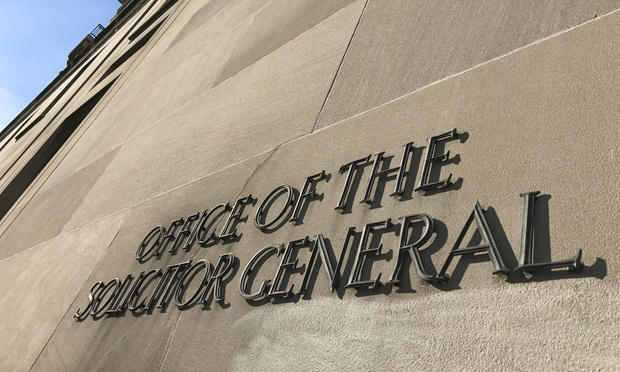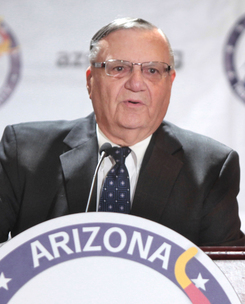 U.S. Solicitor General’s Office at Main Justice. Credit: Mike Scarcella/ ALM
U.S. Solicitor General’s Office at Main Justice. Credit: Mike Scarcella/ ALM
An Arizona federal trial judge should have erased former sheriff Joe Arpaio’s criminal contempt verdict and other rulings after President Donald Trump granted a pardon, the U.S. Justice Department said Wednesday in a statement to the U.S. Court of Appeals for the Ninth Circuit.
The Justice Department’s statement was a response to an earlier court order that directed the government to say what position, if any, prosecutors would take in Arpaio’s appeal.
 Joe Arpaio.
Joe Arpaio.
Main Justice took no position on whether the appeals court should appoint a friend-of-the-court to defend the judge’s ruling from October. The appeals court will likely appoint a lawyer to advocate in defense of U.S. District Judge Susan Bolton of the District of Arizona.
Bolton in October said the president’s pardon of Arpaio, although valid, “does not erase a judgment of conviction, or its underlying legal and factual findings.” Bolton earlier found him guilty of violating a court order that commanded he stop certain immigration-related law enforcement practices. Arpaio was awaiting sentencing for contempt at the time the president pardoned him.
“The court found defendant guilty of criminal contempt. The president issued the pardon. Defendant accepted. The pardon undoubtedly spared defendant from any punishment that might otherwise have been imposed. It did not, however, ‘revise the historical facts’ of this case,” Bolton wrote in her order.
The Justice Department in the trial court had urged Bolton to vacate her earlier orders. The government will continue that advocacy in the Ninth Circuit appeal. Arpaio is represented in the Ninth Circuit by the Phoenix firm Wilenchik & Bartness.
“There is no case law directly addressing whether vacatur is appropriate under the circumstances at issue here—when a presidential pardon moots a criminal prosecution after a finding of guilt but before a judgment of conviction is entered,” John Keller of the DOJ’s public integrity section, wrote in court papers in September.
Arpaio’s pardon unleashed a surge of criticism from lawyers, who argued the move undermined the independence of the judiciary. Jack Goldsmith, the Harvard Law professor and former head of the DOJ’s Office of Legal Counsel in the President George W. Bush administration, called Trump’s decision an “irresponsible (but lawful) exercise of the presidential pardon power.”
The U.S. Solicitor General’s Office would have approved the department’s participation in the case. “The government has entered an appearance in this case and intends to represent the government’s interests in this appeal,” James Pearce, an appellate lawyer in the Criminal Division, wrote in the filing.
The government’s filing Wednesday was made under the name of John P. Cronan, the acting assistant attorney general in charge of the Criminal Division at Main Justice in Washington.
Cronan is a veteran federal prosecutor, having served an earlier stint as an assistant U.S. attorney in the U.S. Attorney’s Office for the Southern District of New York. Brian Benczkowski, a Kirkland & Ellis white-collar partner in Washington, is awaiting a confirmation vote to lead the Criminal Division.
The Justice Department’s statement to the Ninth Circuit is posted below:


